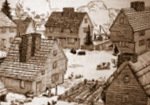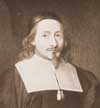from Founders of the Massachusetts Bay Colony by Sarah Saunders Smith
John Sanders, son of John Sanders of Weeke, baptized March 23, 1613, in the Parish of Downton, County of Wiltz, England, came to New Salem, in New England, in the Margaret from Plymouth, Hugh Weston, master, in company with John Endicott and his colony, June 28, 1628-9. He is recorded as a lad about eighteen, but we perceive by the above record that he was scarcely sixteen at that time.
From the parish records we perceive that he had two sisters, Elizabeth and Sarah, who a few years later came to the colony, and respectively became the wives of Henry Walcott and Robert Pike.
John Sanders was son of John Sanders of Weeke, by his second wife. Ales Coles, married February 4, 1610.
John Sanders came to the colony under the protection of Robert Coles, probably his uncle, and received a grant of 40 acres adjoining Mr. Coles. Mr. Robert Coles was one of the wealthiest investors in the colony at that time.
John Sanders united with the first church in Salem, 1629.
1636. John Sanders was made freeman, and granted 40 acres freeman's land, grant No. 2385...
About 1636, John Sanders, was married to Priscilla [sic-Elizabeth] Grafton, daughter of Capt. Joseph Grafton, and wife Mary; a family much respected and often mentioned in our earliest records.
The grant of land to John Sanders is the present location of the south side of Washington Square in Salem, Mass., adjacent to the common, extending along the Main street (Essex street) beyond the Pickman house and East India Marine society to the foot of Liberty street, at ye point of the burying ground. A portion of this land remained in the family for many generations.
Upon the knoll side of the lot, facing the common, but what was then the Public pasture land or training ground, John Sanders built his house.
The house must have been a substantial one and well fenced in, for at a general town meeting held the fourth day of the second month, 1640, it was ordered
that all fences as well general as particular about the town shall be continued sufficientile made and maintained...
1640. Same day John Sanders was appointed surveyor. Voted,
at a general court town meeting, held the day aforesaid in the field where Mr. Williams' house is, Mr. Kenniston and Mr. John Sanders are appointed overseers, to survey the fences in that field.
He had been already appointed freeman at this time...
1639-l640. John Sanders served as a member of the grand jury at the Court...
The life of John Sanders in this little colony was very short, but for a young man of his age he certainly received recognition from the colony of his ability and integrity, having been appointed juryman, surveyor and freeman to the General Court.
He died 1643, 10m., leaving wife, Priscilla Grafton, and one son, John 3, baptized in the first church 1640 1 m. 9d.
The will of John 3 Sanders, dated Oct. 12, 1643. Probated at Salem Court house, 10m., 1643.
Sagamore, Jan. 21st.
John Sanders, inhabitant of town of Salem.
I do leave unto me son, John Sanders, my ten aker lot, with me house now built, on the commons side front knoll over against, solon he comes to the on e twenty-five or at the death of his mother, with the aker and pastare of meadow bound alonging it, and I do make my father [in-law], Joseph Grafton and Goodman Hardie to admr. this my will and deed, the 12 of Octover.
12 October. I of scd boon oaks in county wit Nathaniel Porter, Ex. also that the scd John Sanders left Gerge Ramell all the rest of the estate to his wife.
The last will and testament of John Sanders received. (Endorsed.)
Court 23, 10m., 1643.



